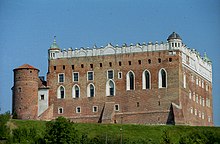Golub War
| Golub War | |||||||
|---|---|---|---|---|---|---|---|
| Part of the Polish–Teutonic War and the Lithuanian Crusade | |||||||
 Golub Castle | |||||||
| |||||||
| Belligerents | |||||||
|
German–Polish Wars | ||||||
Holy Roman Empire
| |||||||
The Golub War was a two-month
Kingdom of Poland and the Grand Duchy of Lithuania in 1422.[1] It ended with the signing the Treaty of Melno, which resolved territorial disputes between the Knights and Lithuania over Samogitia
that had dragged on since 1398.
Background
The
Samogitian Diocese in Varniai and appointed Matthias of Trakai
as its first bishop. However, it did not solve the underlying territorial disputes by the time it ended in 1418.
A new, but futile, round of negotiations started in May 1419 in
Jogaila, King of Poland. After their deaths Samogitia was to return to the Teutonic Knights. Other territorial claims were also rejected. The emperor granted the Knights even more rights than they demanded in negotiations.[4] This decision was probably influenced by the fact that Sigismund hoped to receive support from the Teutonic Knights in his war with the Hussites, who were supported by Vytautas. Vytautas and Jogaila categorically refused to accept this decision. Jogaila unsuccessfully appealed to Pope Martin V.[3]
The war
In July 1422, the Emperor Sigismund and the Teutonic Knights devoted resources to a war against the
Jogaila used the preoccupation with defense against the Hussite raids by attacking Prussia and the Order.[3] Teutonic Grand Master Michael Küchmeister von Sternberg was forced to resign in March. His successor Paul von Rusdorf released most of the hired mercenaries; the Order was left with very few soldiers to defend itself.[5] Joint Polish and Lithuanian forces marched north to Osterode, Teutonic forces retreated to Löbau. When it became clear that siege engines would not arrive, Jogaila ordered an advance towards the Order's fortified capital of Marienburg.[5] His army captured Riesenburg and pillaged surrounding villages. Heading south to Chełmno Land, the Poles and Lithuanians then captured Golub, but failed to take Schönsee.[5] Jogaila decided to end the war quickly before the overwhelmed Prussian troops of the Order could receive reinforcements from the Holy Roman Empire that Paul von Rusdorf had requested.[6] A truce was signed on September 17, 1422, and the war concluded ten days later with the Treaty of Melno. This ended the territorial disputes and fights between Lithuania and the Teutonic Knights. Poland, however, resumed fighting with the Order once again in 1431–1435 when the Order supported Švitrigaila and not Polish-backed Sigismund Kęstutaitis as the successor of Vytautas
.
References
- ISBN 1-84176-561-9.
- ISBN 83-06-01796-X.
- ^ ISBN 9986-810-13-2.
- ^ LCCN 79346776.
- ^ ISBN 0-929700-25-2.
- ISBN 0-14-026653-4.



